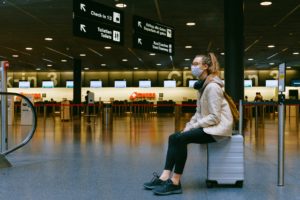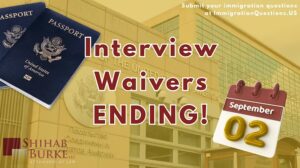COVID-19 has made traveling outside the U.S. a bit more complicated. In addition to the specific rules about the time a Lawful Permanent Resident (LPR) can be outside the U.S., the pandemic has made staying within those guidelines trickier. Lockdown orders and cancelled flights are just some of the ways your short trip outside the U.S. can turn into an unexpectedly longer one.

Travel Only in Urgent Circumstances
Generally, for a Lawfully Permanent Resident to be eligible for U.S. citizenship by naturalization, they must be present in the U.S. for a certain period and not be absent for longer than a certain period as well. Therefore, it is advisable to limit your travel outside the U.S. and be very knowledgeable about these rules so as not to delay your ability to become a U.S. citizen. It is understandable if you must travel for family-related issues or medical emergencies, but you will still need to take steps to make sure your absence from the U.S. is timely.
Timeframes to Maintain LPR Status
To maintain your LPR status, follow these guidelines when planning a trip abroad. Failure to follow these guidelines can result in loss of LPR status and the subsequent inability to naturalize.
- Absence from the U.S. for less than 180 days –there is no presumption of abandonment of LPR status. This means that unless there is clear evidence the U.S. government has about your intention to abandon your permanent residence, such as accepting a job abroad or filing your U.S. taxes as a nonimmigrant, you should be fine.
- Absence from the U.S. for more than 180 days but less than one year – this is a tricky situation, because there is a rebuttable presumption that you may have abandoned permanent residence (meaning the government presumes you have abandoned your residence and the burden is on you to prove otherwise). Here you must be able to show ties to the U.S. such as job, bank account, owning a home or a car to demonstrate you did not intend to abandon your permanent residence in the U.S.
- Absence from the U.S. for more than one year – this leads to automatic loss of LPR status unless appropriate steps were taken before departure to preserve your status; or unless your absence is excused and is beyond your control or some of the exceptions prescribed by law apply to you.
Reentry Permit Can Preserve LPR Status
If you believe that your trip outside the U.S. will entail you being absent from the U.S. for more than one year, you should apply for a Reentry Permit with the USCIS before you leave for your trip.
You will need to plan ahead as much as possible since you must be in the U.S. when you submit your application as well as when you go for biometric processing. The fingerprinting appointment may be scheduled for anytime between several weeks to several months after USCIS receives your application.
How to Apply for Reentry Permit
It is best to seek the help of an experience Columbus immigration attorney when applying for a Reentry Permit. In general, Form I-131 must be filed at least 60 days before your intended trip. As stated previously, you must be physically present in the U.S. when this form is filed.
The Reentry Permit is valid for two years from the date of issuance.
Abandoned LPR Status
If you do not obtain a Reentry Permit before leaving the U.S. and stay abroad for over one year, you may be considered to have abandoned your LPR status.
SB-1 Returning Resident Visa
If you do happen to be absent from the U.S. for longer than one year and did not get a Reentry Permit, you may apply for an SB-1 Returning Resident visa before coming back to the U.S. from a U.S. embassy or consulate in the country where you are residing.
Inability to Return Due to Pandemic
If you are unable to return to the U.S. within one year due to impact of the pandemic, you will need to show that you intended to return but you were unable due to the pandemic and provide proof of some or all of the following:
- Timely attempts to travel back to the United States – canceled airline travel documents and emails or other documents showing your intent to return to the U.S. and your inability to travel.
- If you do not have these, you must provide evidence of why you could not travel (evidence of local lockdowns or government-mandated travel restrictions).
- Continued ties to the U.S. – payment of mortgage or rent.
- Document your temporary housing arrangement, meaning you do not own property in the foreign country.
- Evidence that you maintained an employment relationship in the U.S., such as an employer letter showing you had a leave of absence or you will be rehired upon your return to the United States.
- Also, provide evidence that you did not work in the foreign country, except possibly for your U.S. employer.
- If applicable, evidence of illness (yourself or family member) that kept you from traveling.
- If applicable, evidence that other family members stayed behind in the U.S. while you were abroad and unable to return.
- Financial evidence of continued U.S. ties – tax returns, banking records, etc.
U.S. Citizenship After Lengthy Absence
As a rule, LPRs who seek to apply for naturalization must have been physically present in the United States for at least half of the required period of continuous residence. For general naturalization, the required period is five (5) years, while for naturalization via marriage the period is three (3) years. Therefore, depending on the nature of your application, the minimum amount of time you must be present is the U.S. is 30 months (2.5 years) or 18 months (1.5 years).
LPRs must also have lived for three (3) months in the state or USCIS district of residence.
Going Forward
It is important to obtain the help of an attorney if you are a green card holder and have stayed outside the U.S. for more than one year due to the pandemic. With offices in Dublin and Columbus, Ohio, Troy, Michigan, and Irving, Texas, our immigration attorneys can help you navigate this tricky area of law.
Additional Travel Information
The immigrant visa ban and H-1B visa ban, both imposed by President Trump, are no longer in force. This allows immigrants and their families to be able to apply for the visa that is right for their situation. Whether it is a permanent status in the U.S. or a temporary work visa, discuss your options with a skilled Columbus immigration attorney.
Lastly, if you are considering traveling to another country, before you go, make sure to inform yourself of any hurdles you may need to deal with, such as:
- Mandatory quarantines;
- Enhanced health screening upon arrival or return;
- Prohibitions on travel for all non-citizens of those countries;
- Temporary closure of consulates.
Shihab Burke LLC Immigration Lawyers Can Help
If you are an immigrant with any questions or concerns regarding your immigration case, LPR status, visas, green card applications, or any other legal matter, speak at once to an experienced Columbus immigration attorney. A good immigration lawyer can help you and your family with any immigration issue you face and defend you if you’re accused of violating immigration law.
Our immigration attorneys will review your forms and applications for thoroughness and accuracy. Immigration laws will continually change, but an experienced immigration attorney will always be able to give you the most up-to-date immigration advice you need.
We have offices in Dublin and Columbus, Ohio, Michigan, and Texas. But our full suite of immigration law services is available to clients nationwide and even around the world.
Contact us today!
Source: Travel Issues for Permanent Residents in Pandemic Times (AILA)









